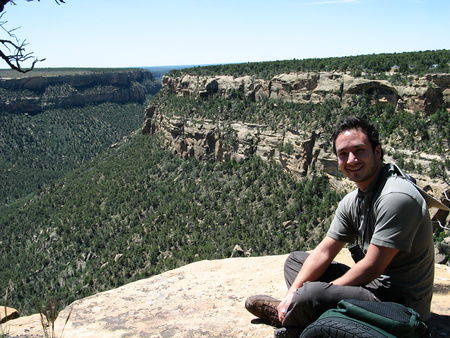Andres Gomez-Lievano
From Santa Fe Institute Events Wiki

My name is Andres Gomez-Lievano, I was born in Bogota, Colombia, almost now 28 years ago. I am about to start my second year in my PhD in Applied Mathematics at Arizona State University.
My general concern is with studying and understanding cities, but I'm very eager to learn about all the other fields and interests that people are bringing to the school.
E-mail: agomez137@gmail.com
Ideas for projects
- What are the underlying mechanisms behind innovation? Empirically we know that in metropolitan areas (at least in the US), bigger cities produce more patents per capita than smaller ones. However, we have also data for the number of inventors in a city. Surprinsingly, patents per inventor remains stable. How is it that cities attract (or create) more `inventors'? I have some data of inventors and patents that could be useful to answer some of the questions regarding innovation.
- My previous focus within the topic of cities, was to study crime. I was not interested in the particular instances (for which there are plenty of studies and anecdotes) but rather in the most general and universal patterns that we may be able to find in urban systems regarding homicides (see this link for part of my work on homicides). Empirically, given a fixed population size, the distribution of homicides is log-normal. Why?? I have some data of homicides for cities in different countries in Latin America, and I think there is still plenty of room to come up with something new by applying a complex systems approach to crime.
Very far from my own comfort zone:
- I am particularly interested in macroecology. I don't have any background, so I am very interested in learning. I want to understand how does the low-entropy energy of the sun gets transformed and degraded by Earth's ecosystems back into empty space. If biological organisms have evolved somehow to use energy efficiently (i.e. degrading efficiently energy gradients), what does allometric scaling say about this? Can this energy gradient determine the "depth" of the trophic levels? I would like to delve at some point in my life to the understanding of biological evolution from a thermodynamic point of view.
Previous works and interests
I did my undergraduate degree in Physics at the Universidad de los Andes in Bogota. I became interested very early during my studies in collective systems and so my emphasis was mostly in Statistical Mechanics. My final degree project was about a simple model of a Sandpile in a Scale-free Network, in which I focused in deriving analytically the 'critical exponents'. I became in love of self-organized criticality, scaling and power-laws, which turned into an interest in the topic of `extreme events', disasters and crisis.
In my master degree in Industrial Engineering I became interested in cities. My thesis was about the effects of the fractal makeup of cities (the urban fabric does not fill space homogeneously and has actually an approximate fractal structure) on traffic. The way cities fill space affects its internal street network, which in turn determines to a great extent its internal traffic dynamics; I analysed a very simple computational model to understand the essentials of this phenomenon.
After I finished my master degree, I worked for a year and a half in the Financial Risk Management division of one Colombia's financial companies.
On a more philosophical side
It is my opinion that we are in a conceptual crisis in the study of cities, and this also interests me. By now, it is clear to me that many of the approaches taken so far to understand cities and explain their differences have been mostly unsuccessful: we still do not know why some cities flourish and thrive and others do not, why some expand while others stagnate, what are the cities good for, or how exactly does the creation of wealth within them comes about. The problem, from my point of view, is not so much that we lack the data, or that we are dealing with systems composed of human beings, each with unique characteristics and complex behaviors, but rather that our conceptual frameworks are inadequate. This inability to have successful theories is, for me, a manifestation that we have been dealing with a wrong set of concepts (to say which ones is also unclear). And no matter how hard we try or how sophisticated we might become, if we are dealing with the wrong concepts to explain a phenomenon, that phenomenon is going to remain unexplained.
It has been recognized for some while now that cities should be understood as 'processes' rather than 'objects'. But thinking of them as processes does not change the fact that we still think of them as actual physical and well defined objects. And in doing so, for example, we assign particular people to particular cities to count their populations, and we create geographical boundaries (political or economical), to construct our urban quantities. I want to challenge that notion. I do not see cities as physical constructions, but rather as abstract social ones. This social construction do manifests itself physically, and indeed we should quantify those manifestations. But I think we should bear in mind that each person has different "degrees of belonging" to different cities, and that there is a continuum between rural and urban areas.
So in the long term, I would like to help develop a different conceptual framework from which we can understand better the urban phenomenon.
